After not being allowed to play in the 2018 and 2022 Winter Olympic Games, NHL players will participate in the 2026 and 2030 Games.
NHLers did not represent their country in the 2018 Winter Olympics because the league was unable to reach an agreement with the National Hockey League Players Association (NHLPA), the International Ice Hockey Federation (IIHF), and the International Olympic Committee (IOC). In 2022, players were originally permitted to go but couldn’t due to pandemic concerns.
Even with the 2026 Olympics in Milan two years away, there is a lot of anticipation about how each country will structure its team based on the talent that has developed over the years.
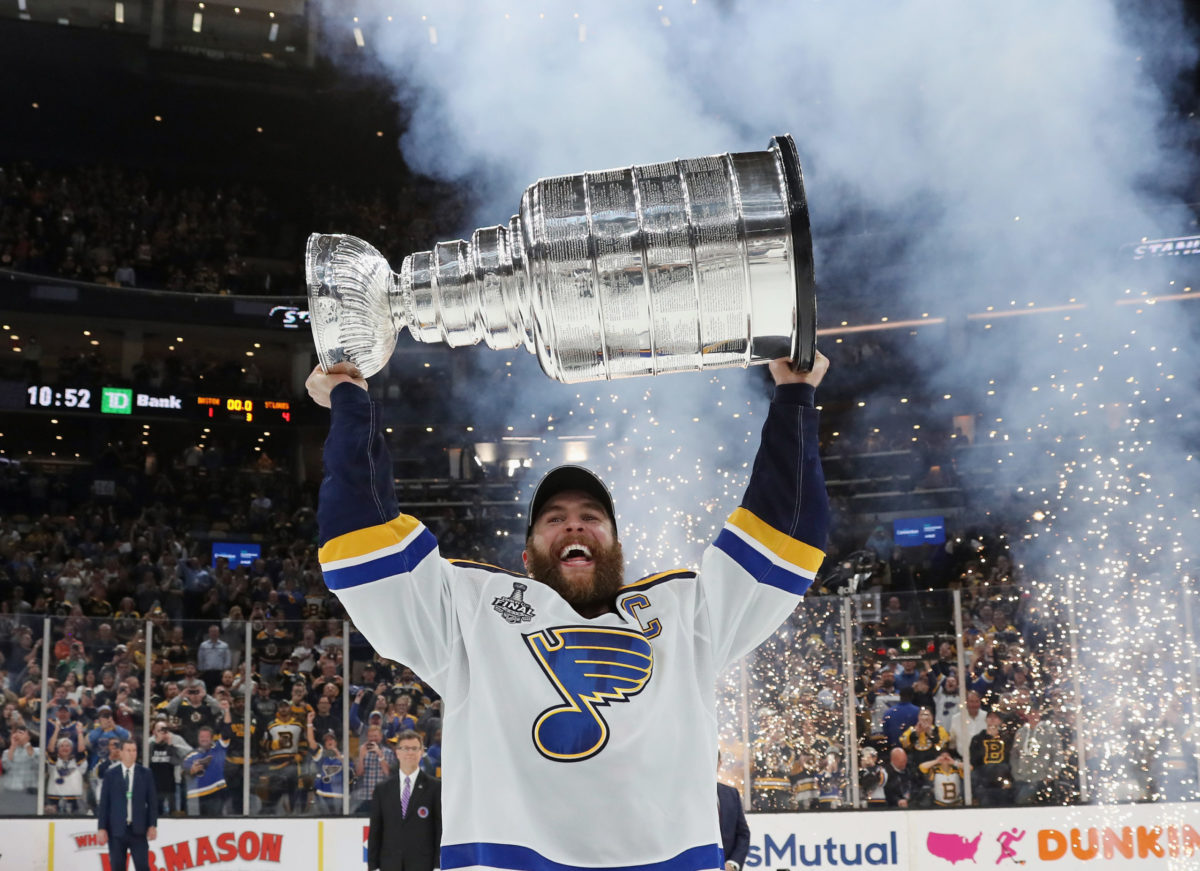
In 2014, the Blues had nine players at the Winter Olympics in Sochi, Russia. Only four of them are still active today, and they are no longer Blues. Here’s a look back at all nine players.
Alex Pietrangelo and Jay Bouwmeester (Team Canada)
This Canadian roster dominated the entire tournament, not only because of its offense but also because of its incredible discipline on defense that allowed very few goals. Players such as Alex Pietrangelo and Jay Bouwmeester were perfect selections, as one was an up-and-coming young defenseman and the other was a veteran talent, respectively.
That season, 2013-24, the Blues were third in the NHL in goals (189) and 28th in the league in goals against (132), making them one of the most dominant teams in the NHL. Pietrangelo was on the ice for 59 of those goals and 44 of the goals against, while Bouwmeester was on the ice for 58 of those goals and 42 of the goals against, making them the most reliable defensemen on the Blues’ roster before the Olympics.
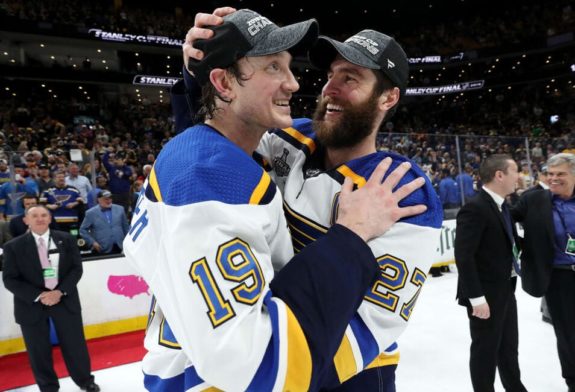
Pietrangelo had played 1449:50 minutes before heading to Sochi, while Bouwmeester played 1383:23 minutes – both were in the top 30 among defensemen in ice time. Despite being placed on the third pairing for Team Canada, Bouwmeester and Pietrangelo played the most combined minutes together among all defensive line combos in the league.
Related: Which Blues Players Will Make The 2026 Olympics
There’s no doubt that they were selected because of their tremendous chemistry together. Canada won the gold medal and only allowed three goals in six games throughout the tournament. Since then, Pietrangelo has won two Stanley Cups, one with the Blues (alongside Bouwmeester) and one with the Vegas Golden Knights, where he currently plays. Bouwmeester retired from the NHL after the 2019-20 season.
Kevin Shattenkirk, T.J. Oshie, and David Backes (Team USA)
In 2013-14, the iconic line of Alexander Steen, David Backes, and T.J. Oshie led the Blues’ offense, playing 474:12 minutes together and scoring 27 goals. Both markers led the team that season.
The Oshie-Backes connection combined for eight points in the 2014 Olympics, scoring four points apiece. This was also Backes’ second Olympic appearance, while Oshie made his first and only Olympic appearance before the NHL stopped participating. Had it participated in 2022, Oshie likely would have been on Team USA.
Meanwhile, Kevin Shattenkirk played a solid defensive role for the USA on their third defensive pairing with Paul Martin, scoring three points.
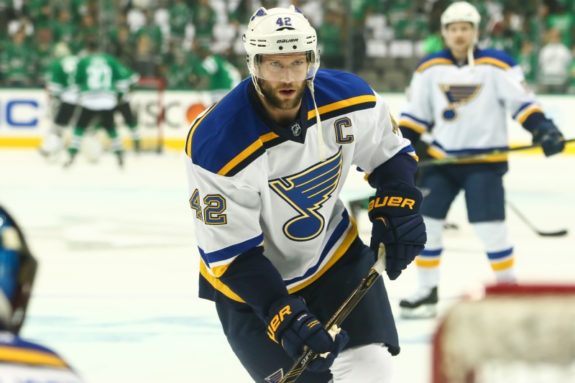
The three Blues players made it to the bronze medal game but lost 5-0 to Finland. Backes had been part of the USA team that made the gold-medal game in Vancouver during the 2010 Olympics, where they eventually lost to Canada in overtime.
Backes and Oshie reunited on Team USA for the 2016 World Cup of Hockey – the same year Oshie joined the Washington Capitals. He also helped them win their first Stanley Cup in 2018. Backes signed with the Boston Bruins in July 2016 as a free agent and made it to the 2019 Stanley Cup Final before losing to his former Blues. The Blues also traded Shattenkirk to the Capitals in the 2016-17 season. He signed with the Tampa Bay Lightning in August 2019 and won the Stanley Cup with them in 2020.
Patrik Berglund and Alexander Steen (Team Sweden)
When Patrik Berglund and Steen were named to Team Sweden in 2014, they were not put on the same line. Steen was a first-line forward, while Berglund shared the third line with Daniel Alfredsson and Gustav Nyquist.
Despite scoring 25 points in 56 games before the Olympics, Berglund wasn’t the highest point producer on the Blues at the time, but for Sweden, he scored three points in six games in Sochi. Steen, who had a breakout campaign — scoring 30 goals and reaching 60 points for the first time in his career — added four points in six games in the tournament.
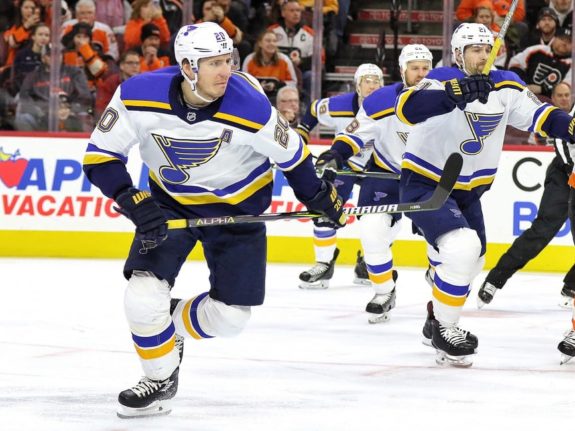
Steen and Berglund played a big role in helping Sweden reach the gold-medal game, where they were shut out 3-0 by Canada. After the Games, their paths diverged as Steen continued to play for the Blues, winning the Cup with them in 2019, while Berglund was traded in the 2018 offseason in a package deal that brought Ryan O’Reilly to St. Louis. He later went back to play in Sweden.
Jaroslav Halak (Team Slovakia)
Slovakia has developed a lot of great players over the years, but if I had to name their best all-time goaltender, it would be Jaroslav Halak. Halak struggled in the 2014 Olympics — only playing two games — despite the anticipation to be a great goaltender for Slovakia due his his few great seasons leading up to the 2014 Games. He ended the tournament with a 0-2-0 record, a .857 save percentage (SV%) and a 5.11 goals-against average (GAA). Slovakia finished last in their group as they were unable to keep up with Russia, USA, and Slovenia.
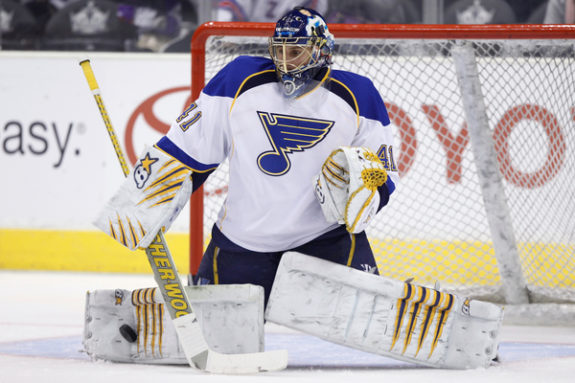
Heading into the tournament, Halak had a record of 24-8-4 with a .915 SV%, a 2.26 GAA, and four shutouts with the Blues. He also played in the 2010 Olympics, where he finished with a record of 3-3-0, a .911 SV%, a 2.24 GAA, and one shutout in seven games.
Halak was traded to the Buffalo Sabres five days after the 2014 Olympics and was then traded to the Capitals a month later.
Vladimir Tarasenko (Team Russia)
The only Russian player on the Blues to make Team Russia in 2014 was Vladimir Tarasenko, who was in his second NHL season. Before going to Sochi, Tarasenko had 34 points in 54 games, playing on the second line at 22 years old. However, in the Olympics, he only scored one point in five games, playing on the third line alongside Artem Anisimov and Nikolay Kulemin.
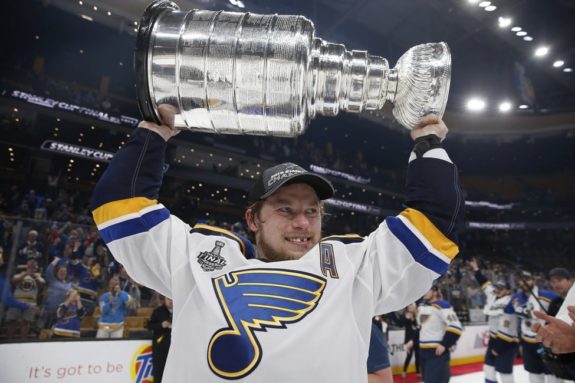
Tarasenko continued to play with the Blues until the 2022-23 season, when he was traded to the New York Rangers before the 2023 Trade Deadline.
Although he did not win a medal with Russia in his last Olympic appearance, he won the Stanley Cup with the Blues in 2019 and will likely be named to Team Russia if they are allowed to participate in the Games in 2026 – he is only 32 years old.
Tarasenko now plays with the Ottawa Senators after signing with them as a free agent in 2023.
Final Thoughts
An honorable mention to this list would have to be Justin Faulk, as he is the only active player currently on the Blues roster to participate in the 2014 Sochi Winter Olympic Games — he represented Team USA but, at the time, was still with the Carolina Hurricanes.
Moving into the next phase for the NHL and the Olympics, it will be exciting to see how well the players have developed, especially considering a lot of potential Blues players could catch the attention of the respective national teams within the next two years. Keep in mind, there will also be the NHL 4 Nations Face-off in replacement of the All-Star Game next season, which will give some of the biggest national teams an advanced look at which players could work for their rosters.
